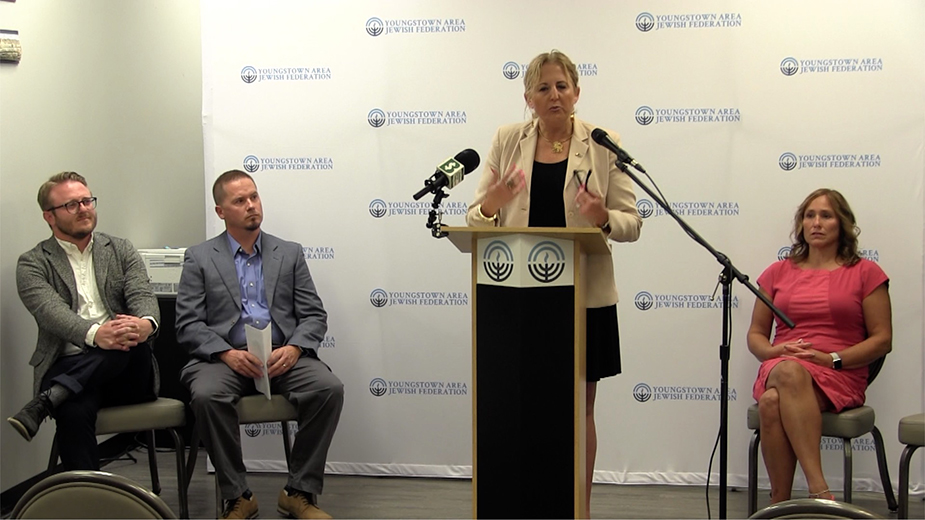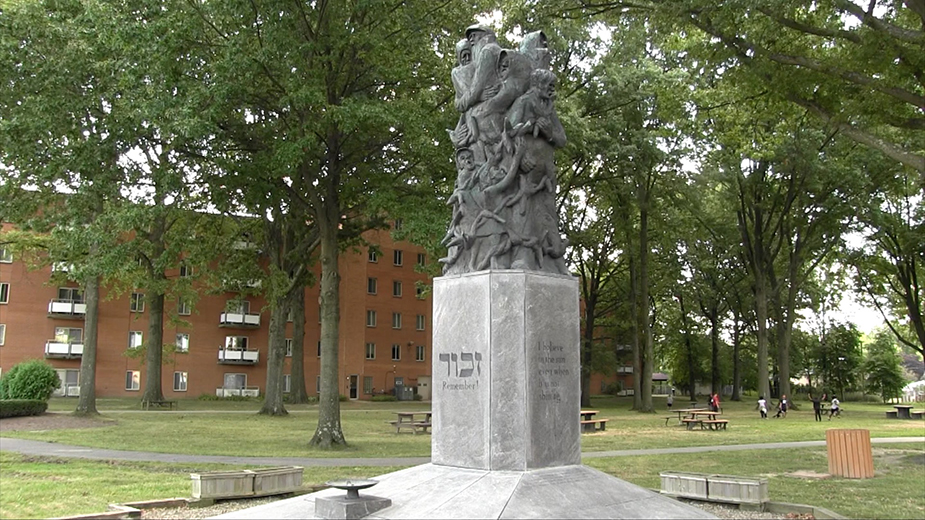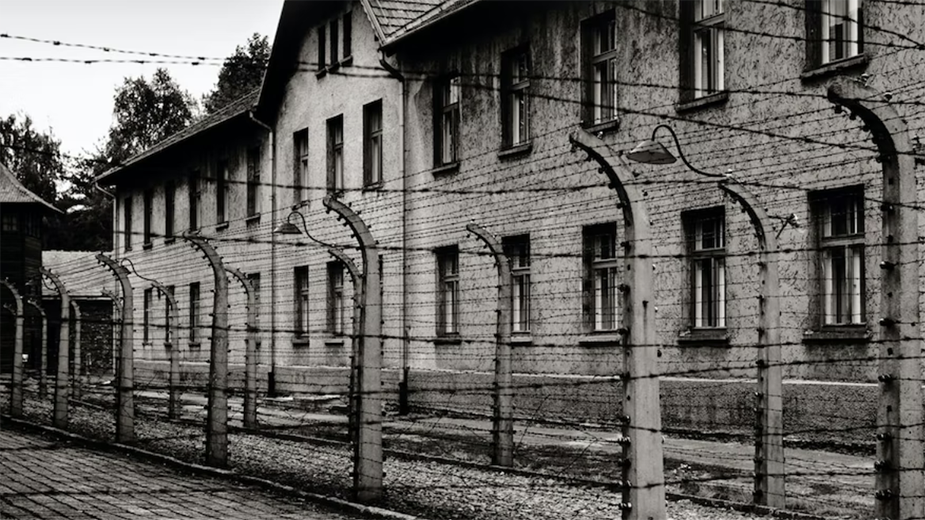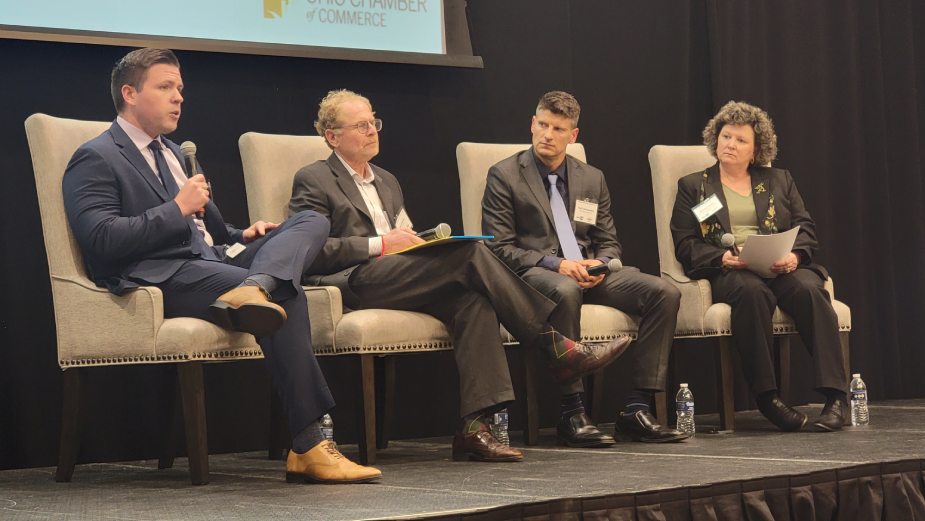Holocaust Survivor Guides Local Teachers Through Auschwitz
YOUNGSTOWN – Standing in 98-degree heat in the same Auschwitz barracks where Howard Chandler was held during World War II, Nannette Jacobs and the other educators traveling there could not help but face a litany of emotions.
Chandler, a 93-year-old Holocaust survivor, accompanied a group of teachers traveling throughout Poland with the Classrooms Without Borders program and told them his story of survival.
“It was so hot,” Jacobs said, noting there were only 48 members of the group and Chandler’s family in that hot building that day as opposed to the 300 to 400 people who once were forced to live there. There’s Howard, walking through and telling us about his experiences and I thought how dare [I] complain … To know when he was there. There was no shade and yet he continued day-by-day to work toward his survival.
Jacobs, a teacher of world religions, contemporary issues and philosophy at Ursuline High School, was one of three local educators, who traveled with the program this summer.
Along with Barry Kimpel, an English teacher, and Grady Long, a history teacher, both at Crestview Local Schools, Jacobs recounted Monday some of the stories from their trip to members of the Youngstown Area Jewish Federation, which helped sponsor their participation.

The group of educators traveled to five cities, including visiting three horrific sites — Treblinka, Majdanek and Auschwitz. They saw the home where Chandler lived as a child, which Long said remains the home of descendants of the family who moved in after Chandler’s family was taken away. They saw the remains of the death camp in Treblinka, where Chandler’s mother, brother and sister were sent to die.
According to the U.S. Holocaust Memorial Museum, about six million Jewish people died during the genocide known as the Holocaust, including about 925,000 estimated at Treblinka.
Long called the experience of traveling with Chandler and seeing these sites intense and overwhelming, something he feels he has not fully grasped in terms of the scope and enormity of what he saw and heard.
The group followed a progression, traveling in the footsteps of many who did not survive, visiting the remains of ghettos, plazas, train platforms, concentration camps and gas chambers.
Long said he tried to put himself in the shoes of those forced into making tough decisions that affected their very survival.
“I’m sure this program will be a source of reflection for years to come,” Long added.
Among the highs and lows Jacobs said she experienced was the knowledge that the Nazis engaged in not just the physical destruction of people. They also used methods to first tear them down emotionally. She described how she felt seeing how people were forced to leave behind all their belongings in suitcases, their shoes and even a room with their hair.
Zachor, Remember
The Jewish Community Center of Youngstown is home to the Schwartz Judaic and Holocaust Resource Center, where materials are housed to tell the stories of survivors.
The center also has traveling exhibits and an educational specialist, which can be requested for schools, religious institution and civic associations.
“I think it’s pretty evident that we chose our inaugural class of educators well,” said Bonnie Deutsch Burdman, the executive director for community relations and government affairs for the federation. “We’re thrilled.”
She said these teachers were selected out of many teachers who applied and they plan to send other groups on similar trips in the summers to come.
Outside the Jewish Community Center is a Holocaust memorial, where a memorial event is often held, said Andrew Lipkin, CEO of the federation. The Holocaust statue, built in 1984, depicts the faces of people surrounded by barbed wire and the Hebrew word Zachor, which means Remember.

Lipkin said he remembers when there would be 25 to 30 local survivors, who would attend a Holocaust memorial event at the statue and who would share their stories of survival. But now, nearly 40 years later, he said only one or two are still alive and they are no longer physically able to tell their stories.
What you are doing is carrying on their memory, said Lipkin to the three teachers in the room.
Burdman said one of the missions of the federation is to educate others and what the three teachers experienced on the trip will give them a more meaningful way to teach their students and other teachers about the Holocaust.
“Thank you for sharing. Thank you for taking the time out of your summer vacations to continue your professional exploration and for your commitment for wanting to take the lessons that you have learned to your students and beyond,” Burdman said.
Passing it on
Now the three teachers, who traveled with the Pittsburgh-based Classroom Without Borders, will search for ways to take what they saw, felt and experienced and share it with their students.
“As an English teacher I am interested in the intersection between rhetoric, language and stories,” Kimpel said, “especially as they pertain to the classical liberal arts tradition of pursuing truth. And I think studying the Holocaust is a great vehicle for teaching students about the ways divisive rhetoric, inflammatory language and troubling narratives can lead down previously unthinkable paths.”
Thanking the federation for providing him with the opportunity of a lifetime, Kimpel said he hopes to teach his students to think critically about what is happening in the world and to try to separate the truth from the falsehoods.
He wants them to recognize that spreading disinformation can lead to history repeating itself. “Stories matter and they shape who we are. But they are only impactful as long as we are willing to listen to them,” Kimpel said.
Likewise, Long said he hopes to be able to share two broad themes with his students as they not only study the history of what happened but look at how it affects the events of today.
“[First, the] constant need to fight against autocracy with democracy,” Long said. “Our society must understand the consequences of allowing authoritarian governments to rise, further divide and separate each other.”
Second, he wants students to understand the importance of listening to each other and to others who might be different than them.
“In a world where we are surrounded by shouting and yelling, we have to promote listening and empathy,” Long said. “The Holocaust is more than a Jewish story. It’s a human story. Even though our study of the Holocaust was largely a study of darkness, it’s also a celebration of resilience.”
While the topic is a difficult one, the teachers talked about the importance of bringing the Holocaust stories to life for the students. Although many students might not live among a diverse group of people and may socialize with a group of friends who think or believe the same as they do, the teachers emphasized studying the stories of the Holocaust is a way to help them understand others.
By sharing their experiences and what Chandler shared as they traveled to the places that so impacted his life, the teachers hope their students can see the Holocaust comes to life for them and become more than just a chapter in their history books.
“Howard is my hero,” Jacobs said. “As terrible as the situation was, Howard provided me with so much hope … That when things are as bad as they can be, he’s kind of that light to me. I need to share his story so others know what happened – so it never happens again.”
IMAGE AT TOP: TheAuschwitzTours.com
Copyright 2024 The Business Journal, Youngstown, Ohio.



